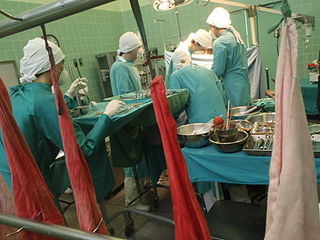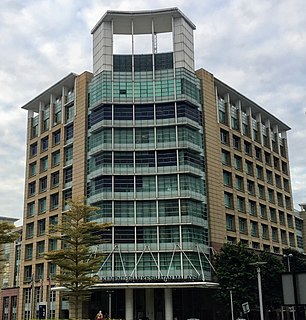External links
| This article related to government in the United Kingdom or its constituent countries is a stub. You can help Wikipedia by expanding it. |
ULTRA, the Unrelated Live Transplant Regulatory Authority, was a British agency that regulated organ transplants. According to the official website:
In September 2006, ULTRA disbanded. Its functions were transferred to the Human Tissue Authority, a Non-departmental public body of the Department of Health.
The Human Tissue Authority (HTA) is an executive non-departmental public body of the Department of Health of the United Kingdom. It regulates the removal, storage, use and disposal of human bodies, organs and tissue for a number of scheduled purposes such as research, transplantation, and education and training.
In the United Kingdom, non-departmental public body (NDPB) is a classification applied by the Cabinet Office, Treasury, the Scottish Government and the Northern Ireland Executive to quangos. NDPBs are not an integral part of any government department and carry out their work at arm's length from ministers, although ministers are ultimately responsible to Parliament for the activities of bodies sponsored by their department.
| This article related to government in the United Kingdom or its constituent countries is a stub. You can help Wikipedia by expanding it. |

Organ donation is when a person allows an organ of their own to be removed and transplanted to another person, legally, either by consent while the donor is alive or dead with the assent of the next of kin.

Organ transplantation is a medical procedure in which an organ is removed from one body and placed in the body of a recipient, to replace a damaged or missing organ. The donor and recipient may be at the same location, or organs may be transported from a donor site to another location. Organs and/or tissues that are transplanted within the same person's body are called autografts. Transplants that are recently performed between two subjects of the same species are called allografts. Allografts can either be from a living or cadaveric source.
The Uniform Anatomical Gift Act (UAGA), and its periodic revisions, is one of the Uniform Acts drafted by the National Conference of Commissioners on Uniform State Laws (NCCUSL), also known as the Uniform Law Commission (ULC), in the United States with the intention of harmonizing state laws between the states.
Allotransplant is the transplantation of cells, tissues, or organs to a recipient from a genetically non-identical donor of the same species. The transplant is called an allograft, allogeneic transplant, or homograft. Most human tissue and organ transplants are allografts.

Kidney transplantation or renal transplantation is the organ transplant of a kidney into a patient with end-stage renal disease. Kidney transplantation is typically classified as deceased-donor or living-donor transplantation depending on the source of the donor organ.
NHS Blood and Transplant (NHSBT) is an executive non-departmental public body of England's Department of Health and Social Care. It was established on 1 October 2005 to take over the responsibilities of two separate NHS agencies: UK Transplant, founded by Dr. Geoffrey Tovey in 1972, and the National Blood Service. Its remit is to provide a reliable, efficient supply of blood, organs and associated services to the NHS. Since NHSBT was established, the organisation has maintained or improved the quality of the services delivered to patients, stabilised the rising cost of blood, and centralised a number of corporate services.
Organ procurement is a surgical procedure that removes organs or tissues for reuse, typically for organ transplantation. It is heavily regulated by United Network for Organ Sharing (UNOS) to prevent unethical allocation of organs. There are over 110,000 patients on the national waiting list for organ transplantation and in 2016, only about 33,000 organ transplants were performed. Due to the lack of organ availability, about 20 patients die each day on the waiting list for organs. Organ transplantation and allocation is mired in ethical debate because of this limited availability of organs for transplant. In the United States in 2016, there were 19,057 kidney transplants, 7,841 liver transplants, 3,191 heart transplants, and 2,327 lung transplants performed.
Certain fundamental Jewish law questions arise in issues of organ donation. Donation of an organ from a living person to save another's life, where the donor's health will not appreciably suffer, is permitted and encouraged in Jewish law. Donation of an organ from a dead person is equally permitted for the same purpose: to save a life. This simple statement of the issue belies, however, the complexity of defining death in Jewish law. Thus, although there are side issues regarding mutilation of the body etc., the primary issue that prevents organ donation from the dead amongst Jews, in many cases, is the definition of death, simply because to take a life-sustaining organ from a person who was still alive would be murder.
The National Organ Transplant Act, approved October 19, 1984, and amended in 1988 and 1990, outlawed the sale of human organs and provided for the establishment of the Task Force on Organ Transplantation; authorized the Department of Health and Human Services to make grants for the planning, establishment, and initial operation of qualified Organ Procurement Organizations (OPOs); and established the formation of the Organ Procurement and Transplantation Network and Scientific Registry of Transplant Recipients. It was sponsored by Rep. Al Gore and Sen. Orrin Hatch.
Organ trade is the trade of human organs, tissues, or other body products, usually for transplantation. There is a global need or demand for healthy body parts for transplantation, far exceeding the numbers available.

Human trafficking in South Africa occurs as a practice of forced labour and commercial sexual exploitation among imported and exported trafficked men, women, and children. Generally, South African girls are trafficked for the purposes of commercial sexual exploitation and domestic servitude, while boys are used for street vending, food service, and agriculture. Anecdotal evidence suggests that South African children can also be forced to provide unpaid labor for landowners in return for land occupancy, living accommodation, or for maintaining labor tenancy rights. In any case, this form of unpaid labor has caused human trafficking to be described as a modern form of slavery. Human trafficking is the result of a combination of several factors, including gender inequality, economic instability, and political conflict. Since Africa experiences all of these, it is an active hub for human trafficking.
In December 2006, The UK Government set up the Organ Donation Taskforce to identify barriers to organ donation and recommend actions needed to increase organ donation and procurement within the current legal framework.
Organ transplantation in Israel has historically been low compared to other Western countries due to a common belief that organ donation is prohibited under Jewish law. This changed with the passage of new organ donation laws in 2008. If two patients have the same medical need, priority will now go to the patient who has signed an organ donor card, or whose family members have donated an organ. This policy was nicknamed don't give, don't get. The law also defines "brain death" as an indication of death for all legal purposes, including organ donation. Additionally the law provides financial reimbursement to living donors for medical expenses due to donation and lost time at work. Organ trafficking is explicitly banned. Health insurance plans can no longer reimburse patients who go abroad to receive transplants.

The Ministry of Health, abbreviated MOH, is a ministry of the Government of Malaysia that is responsible for health system: health behavior, cancer, public health, health management, medical research, health systems research, respiratory medicine, health promotion, healthcare tourism, medical device, blood collection, leprosy control, clinical research, health care, dental care, health institution, laboratory, pharmaceutical, patient safety.

The Human Tissue Act 2004 is an act of the UK parliament applying to England, Northern Ireland and Wales. It consolidates previous legislation and created the Human Tissue Authority to "regulate the removal, storage, use and disposal of human bodies, organs and tissue."

China is a main source and also a significant transit and destination country for men, women, and children who are subjected to trafficking in persons, specifically forced labour and forced prostitution. Women and children from China are trafficked to Africa, Europe, Latin America, the Middle East, and North America, predominantly Taiwan, Thailand, Malaysia, and Japan for commercial sexual exploitation and forced labor. Women and children from Myanmar, Vietnam, Mongolia, former USSR, North Korea, Romania and Ghana are trafficked to China for commercial sexual exploitation and forced labour.
The practice of selling one's kidney for profit in Iran is legal and regulated by the government. In any given year, it is estimated that 1400 Iranians sell one of their kidneys to a recipient who was previously unknown to them. Iran currently is the only country in the world that allows the sale of one's kidney for compensation ; consequently, the country does not have either a waiting list or a shortage of available organs.

Reports of organ harvesting from Falun Gong practitioners and other political prisoners in China have raised increasing concern by some groups within the international community. According to the reports, political prisoners, mainly Falun Gong practitioners, are being executed "on demand" in order to provide organs to recipients. The organ harvesting is said to be taking place both as a result of the Chinese Communist Party's persecution of Falun Gong and because of the financial incentives available to the institutions and individuals involved in the trade.
Organ donation is when a person gives their organs after they die to someone in need of new organs. Transplantation is the process of transplanting the organs donated into another person. This process extends the life expectancy of a person suffering from organ failure. Unfortunately the number of patients requiring organ transplants outweighs the number of donor organs available.